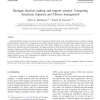Free Online Productivity Tools
i2Speak
i2Symbol
i2OCR
iTex2Img
iWeb2Print
iWeb2Shot
i2Type
iPdf2Split
iPdf2Merge
i2Bopomofo
i2Arabic
i2Style
i2Image
i2PDF
iLatex2Rtf
Sci2ools
123
click to vote
DSS
2007
2007
Strategic decision making and support systems: Comparing American, Japanese and Chinese management
Internationalization creates a need to know how managers in different parts of the world make decisions, and how computerbased information systems (IS) can support decision making. Business leaders from the United States, Japan and China were each found to have a distinctive prevailing decision style that reflects differences in cultural values and the relative needs for achievement, affiliation, power and information. This paper examines the IS issues that arise from the discovery of the distinctively American, Japanese and Chinese styles of strategic decision making. The existence of international differences in analyzing and conceptualizing strategic decisions raises doubts about the global applicability of IS such as decision support systems and executive information systems. The success of knowledge management and information systems in different countries and cultures will depend critically on how well IT applications are adapted to the decision styles of their users. © 2006 El...
| Added | 13 Dec 2010 |
| Updated | 13 Dec 2010 |
| Type | Journal |
| Year | 2007 |
| Where | DSS |
| Authors | Maris G. Martinsons, Robert M. Davison |
Comments (0)

